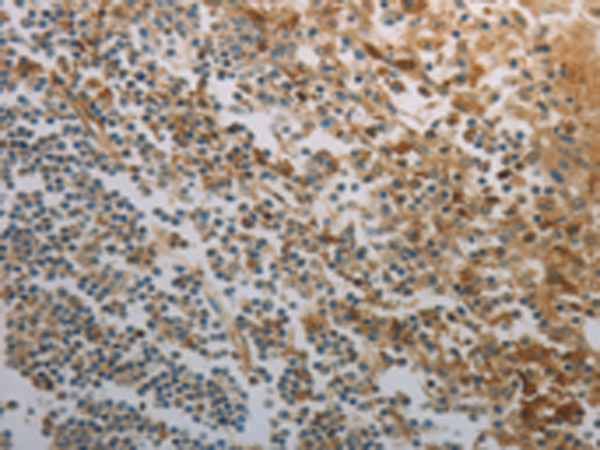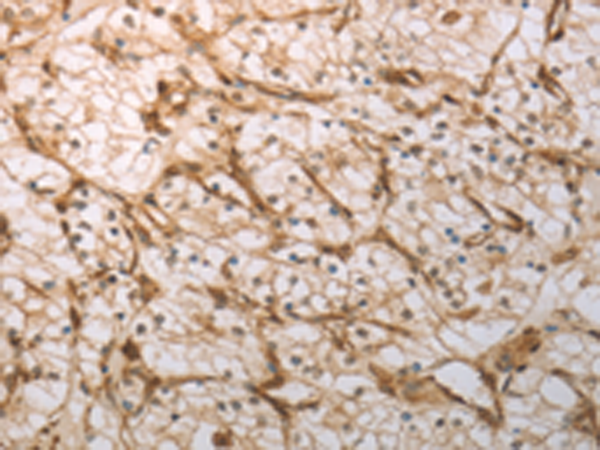

| WB | 咨询技术 | Human,Mouse,Rat |
| IF | 咨询技术 | Human,Mouse,Rat |
| IHC | 1/150-1/500 | Human,Mouse,Rat |
| ICC | 技术咨询 | Human,Mouse,Rat |
| FCM | 咨询技术 | Human,Mouse,Rat |
| Elisa | 1/1000-1/5000 | Human,Mouse,Rat |
| Host/Isotype | Rabbit IgG |
| Antibody Type | Primary antibody |
| Storage | Store at 4°C short term. Aliquot and store at -20°C long term. Avoid freeze/thaw cycles. |
| Species Reactivity | Human, Mouse, Rat |
| Immunogen | Fusion protein of human INHA |
| Formulation | Purified antibody in PBS with 0.05% sodium azide and 50% glycerol. |
+ +
以下是关于INHA(抑制素α亚基)抗体的3篇参考文献示例,包含文献名称、作者及摘要概括:
---
1. **文献名称**:*"Immunohistochemical Localization of Inhibin Alpha in Human Ovarian Tumors"*
**作者**:Vassalli A, et al.
**摘要**:研究利用INHA特异性抗体检测人卵巢颗粒细胞瘤中的抑制素α表达,证实其作为生物标志物在鉴别诊断中的价值,尤其在区分生殖系统肿瘤亚型中的应用。
2. **文献名称**:*"Altered Inhibin Alpha Levels in Polycystic Ovary Syndrome: Insights from Antibody-Based Assays"*
**作者**:Roberts CT, Knight PG.
**摘要**:通过INHA抗体检测多囊卵巢综合征(PCOS)患者血清及卵泡液中的抑制素α水平,发现其与促卵泡激素(FSH)调控异常相关,提示INHA在PCOS病理机制中的作用。
3. **文献名称**:*"Development of a Monoclonal Antibody to Inhibin Alpha for Fertility Studies in Ruminants"*
**作者**:Findlay JK, et al.
**摘要**:报道一种新型INHA单克隆抗体的开发,并应用于反刍动物模型,证明其在监测卵泡发育和生育力评估中的高效性,为生殖管理提供工具。
---
注:上述文献信息为示例性概括,实际引用时需核实具体来源及准确性。如需近期研究,建议通过PubMed或Google Scholar以“INHA antibody”、“inhibin alpha immunoassay”等关键词检索。
The INHA antibody targets the inhibin alpha subunit, a key component of the glycoprotein hormone inhibin, which belongs to the TGF-β superfamily. Inhibin is primarily produced in the gonads and plays a critical role in regulating follicle-stimulating hormone (FSH) secretion from the pituitary gland. The alpha subunit (INHA) combines with beta subunits (βA or βB) to form inhibin A or B, respectively, which suppress FSH production. Conversely, free beta subunits form activins, which stimulate FSH release. Dysregulation of INHA expression has been linked to reproductive disorders, including premature ovarian insufficiency and granulosa cell tumors.
INHA antibodies are widely used in research and diagnostics to detect inhibin alpha levels in tissues or serum, aiding in studies of reproductive biology and pathologies. They serve as tools to investigate ovarian reserve, gonadal function, and tumor markers, particularly in ovarian cancers where inhibin alpha is often overexpressed. Commercially available INHA antibodies include monoclonal and polyclonal variants, validated for applications like Western blot, immunohistochemistry, and ELISA. Recent studies also explore INHA's role in non-reproductive contexts, such as modulating immune responses or cancer progression in prostate and breast tissues. However, challenges remain in standardizing assays due to potential cross-reactivity with related proteins. Ongoing research aims to refine antibody specificity and expand clinical applications, including fertility assessments and targeted therapies for hormone-sensitive cancers.
×